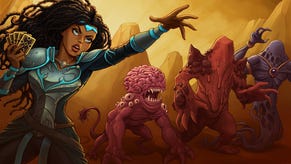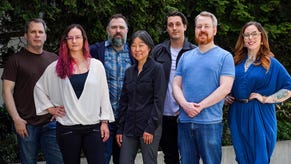GDC: Shigeru Miyamoto's Keynote Speech
Today at GDC 2007, Shigeru Miyamoto returned to a stage he's been away from for eight years. In a keynote presentation entirely devoid of bluster, showboating and hype, the creator of Donkey Kong and other iconic gaming characters outlined his personal vision of creativity and its similarities to the corporate structure at Nintendo.
Here, GamesIndustry.biz brings you some of the choice quotes from a visionary game designer.
On returning to GDC...
"It's been eight years since we've had the chance to talk and it seems you haven't aged a bit."
On the days of the N64, the sale of violent games, and the creative crossroads...
"About this time people believed that gamers were just having harmless fun. They were just experiencing the most popular form of entertainment. But within a few years something changed - reporters wanted to ask me about the games themselves. They wanted to ask me about the perceived effect the game might be having on people; they somehow thought that we were changing gamers into some kind of zombies."
"Even as sales went up, our reputation as an industry went down. It's true that for most of us that are games designers, there seemed to be only one way to go forward. The players themselves seemed to say we want more of the same kind of game. This was the period when Nintendo, and myself personally, found ourselves at a crossroads. We needed to decide whether we were going to follow our historic long-time vision."
On the creative essence...
"The essence of any game designer is the creative vision. It's important to understand that no matter how clear your own personal vision, it must somehow resonate with the vision of the company."
On the Wife-O-Meter...
"I have my own personal way of determining whether a game is expanding the audience [for games]. I don't know if I can put this in English very well, so I'll just call it the Wife-O-Meter. It measures only one variant."
On the convincing power of the DS...
"[Brain Age] turned [my wife] into a true gamer. Thanks to this she's now accepted videogames as part of her daily life. She finally understands the unique form of entertainment found in videogames."
On Nintendo's devotion to the entertainment business...
"We're fortunate that we don't have to worry about business applications. Without needing to outsource resources every employee is free to focus solely on entertainment. As a result our company has a balance where both software programmers and engineers both have an equal understanding of entertainment. That makes us more efficient in developing new products. At Nintendo programmers and engineers are in the same building. There are not separated by acres, miles or oceans."
On working as a team...
"I've been involved in every design of every Nintendo console controller since the NES. But I don't want to say this so that people will think, 'Oh, Miyamoto made this controller.' Or to think that any one person made a game controller. It doesn't work that way at Nintendo; it's a group collaboration."
On the dilemma of the Wii remote...
"The overall concept that the Wii team wanted themselves was that the controller would be simple and accessible to everyone. The engineers had a lot of ideas about how different technologies could be created. Software designers were very enthused because they could create new styles of gameplay. But at the same time they didn't want something that was so different that it would force us to turn our backs on the heritage that we've invested in all of our key franchises."
On positive game design...
"Of course I understand that other designers work with other missions, other emotions - sometimes fear, or horror, or revenge, or violence - and that's fine. There is no right or wrong in what feelings are triggered. All that's important is the final result that you want the player to experience... All I'm saying is, in my personal case, the feeling that I always strive for is positive."
On designers' mistakes...
"We as game designers often repeat the same mistakes, and that's because we're too familiar, we know too much about the games we're making. We tend to forget that actual gamers will come into it not knowing anything about the games we've been creating. When we're creating the game, we have to force ourselves to make the software purely from the viewpoint of the game player. In fact, I think this is the way that your vision will be most clearly conveyed to the players."
On game delays...
"I feel this so strongly that if I think we need to drastically change the spec, or even delay a game, I'm willing to take that risk."
On game reviewers...
"We've learned many core gamers find themselves enjoying Wii Play, because they've found a new value in this kind of software - it's a game they can play with their non-gaming friends... So maybe all you game reviewers out there need to add a new category in which you score games - how hard it is for people who don't play them."
On never having enough...
"Every developer on every game ever made thinks the same - 'Not enough.' Not enough people, not enough budget, and not enough time. Of course the more we are dedicated to providing maximum enjoyment for the players, the more we have this feeling."
On asking Iwata for more...
"It's natural for us to feel that in order for people to enjoy themselves, we have to add more gorgeous looking graphics, and more content... I often go to Mr Iwata with these same complaints. And unfortunately, he usually responds the same way. I bet your bosses probably respond - 'Too bad.'"
On waiting for technology to play catch up with ideas...
"Pursuing the latest technology is one way to create something revolutionary, but something really new offers more when the designer has a persistently held idea they've had for a long time, and they wait long enough for new technology to come and make that dream come alive."
On new Mii plans...
"I'm actually working on a new Mii channel. With this channel, we're going to allow people to compare the Miis we've created, hold popularity contests, and you'll be able to do this with people all around the world using this one editor to create Miis."
On Mario 128...
"The one question I'm always asked is, 'What happened to Mario 128?'... The purpose of that demo was to show how the new technology in the GameCube could dynamically change the nature of Mario games. So when people ask me what happened to it, I'm always at a loss as to how to answer it, because most of you have already played it - but you played it in a game called Pikmin. This game featured one element of Mario 128 that allowed a large number of characters to operate independently and as a group - it's advanced AI. But of course if I was to tell you all that this is what happened to Mario 128, you'd all be pretty angry."
On Super Mario Galaxy...
"So you'll be experiencing another element of Mario 128 fairly soon. In Super Mario Galaxy, you'll be playing on numerous spherical stages, and this was one of the experiments we were conducting at the time of Mario 128... You'll be able to play Super Mario Galaxy this year."
On Miyamoto's personal vision...
"My main message to you today is that creative vision is not simply one element of game design. It is the very essence of game design. But your vision does not have to be my vision - I am only one person."
On the future of the industry...
"The future of our industry depends on how successful you will be in applying your vision to your videogames. After seeing all the independent games nominated for the GDC awards, I don't think I need to tell you any of this. You've given me a lot of faith about the future of this industry."
On reaching the wider audience...
"For me, the measure of success is when one project breaks out past classical videogamers and becomes a social phenomenon... It's not enough to just please those of us who already love videogames. We must reach out to those who don't care about that kind of entertainment, and even those who fear it."
In conclusion...
"With our tools, with our creative vision, and with the courage of our conviction, I know that we can do it... If we can combat my wife, we can combat anybody."
To read the live text account of Miyamoto's speech, visit Eurogamer.net








